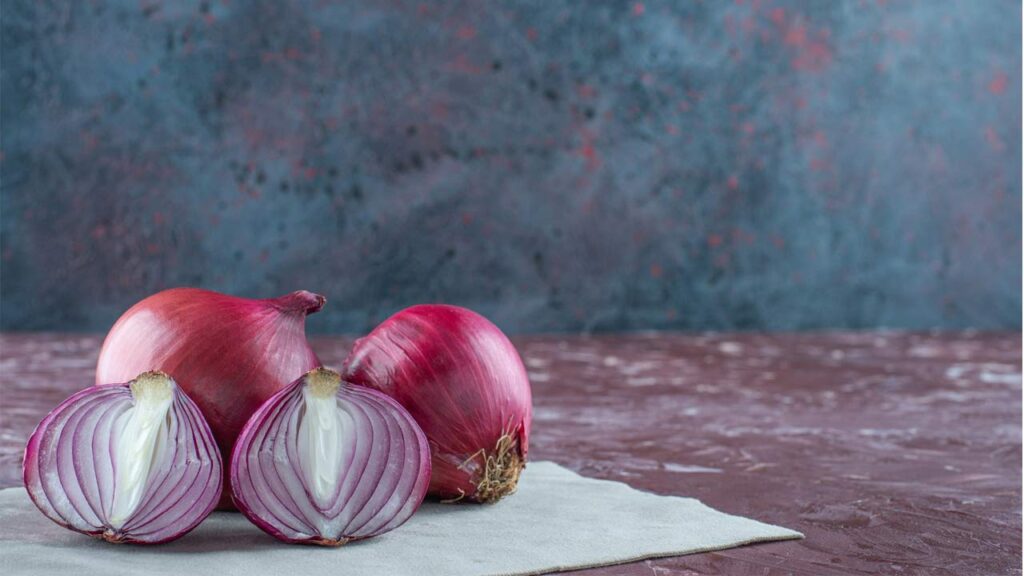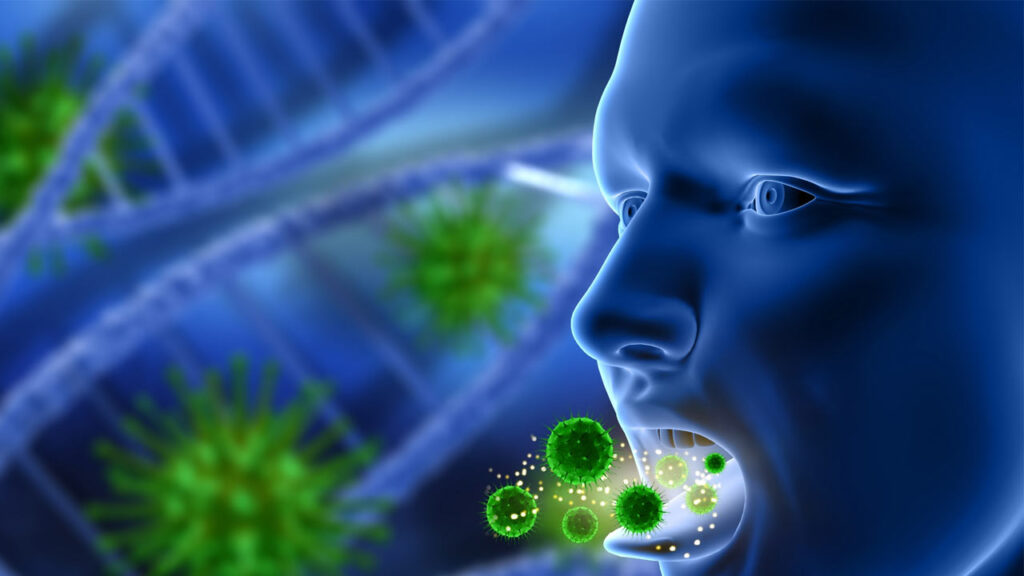Mouth bacteria are microorganisms that live in the oral cavity and can cause various dental problems, such as tooth decay, gum disease, and bad breath. While some mouth bacteria are beneficial and help with digestion and immunity, others are harmful and produce acids and toxins that damage the teeth and gums. Therefore, it is important to maintain a healthy balance of mouth bacteria and prevent the growth of harmful ones.
One way to do that is by eating foods that can kill mouth bacteria or inhibit their activity. These foods can help improve oral hygiene and prevent dental problems by reducing plaque, tartar, inflammation, and infection. Some of these foods are:

Onions.
Onions are one of the foods that can kill mouth bacteria effectively. They contain sulfur compounds that have antibacterial properties and can fight against several types of oral bacteria, such as Streptococcus mutans, Porphyromonas gingivalis, and Prevotella intermedia. Onions are most effective when eaten raw, as cooking can reduce their sulfur content and activity. Onions can also help remove stains and plaque from the teeth by acting as a natural abrasive.
Peppers.
Peppers, especially spicy ones like jalapenos or habaneros, can also kill mouth bacteria by creating an acidic environment that inhibits their growth. Peppers contain capsaicin, a compound that gives them their heat and can irritate the oral tissues. This irritation can stimulate saliva production, which can neutralize the acids and wash away the bacteria. Peppers can also help lower blood sugar levels and improve blood circulation, which can benefit oral health.
Wasabi.
Wasabi is a green horseradish that is commonly used in Japanese cuisine, especially with sushi. Wasabi has a strong antibacterial effect against oral bacteria, especially Streptococcus mutans, which is responsible for tooth decay. Wasabi contains isothiocyanates, compounds that can inhibit the enzyme that helps S mutans adhere to the tooth surface and form plaque. Wasabi can also help prevent food poisoning by killing harmful bacteria in raw fish.
Shiitake mushrooms.
Shiitake mushrooms are edible fungi that have various health benefits, including killing mouth bacteria. Shiitake mushrooms contain lentinan, a type of sugar that can prevent the growth of oral bacteria by interfering with their metabolism. Lentinan can also reduce inflammation and enhance immunity in the oral cavity. Shiitake mushrooms are best eaten cooked, as raw ones may contain toxins or allergens.
Probiotics.
Probiotics are foods or supplements that contain live beneficial bacteria that can improve the balance of the oral microbiome. Probiotics can help kill or suppress harmful mouth bacteria by competing for nutrients and space, producing antimicrobial substances, modulating immune responses, and enhancing oral health. Some examples of probiotic foods are yogurt, kefir, cheese, sauerkraut, kimchi, miso, tempeh, and kombucha.
These are some of the foods that can kill mouth bacteria and help you maintain a healthy and fresh mouth.
How to Eat Foods That Kill Mouth Bacteria Properly and Effectively?
Eating foods that can kill mouth bacteria or inhibit their activity can help improve oral hygiene and prevent dental problems by reducing plaque, tartar, inflammation, and infection. However, eating these foods properly and effectively is not a simple or straightforward task. It requires some attention and care. You need to follow some tips and guidelines when eating foods that kill mouth bacteria, such as:
- Eat them in moderation and balance. You should eat foods that kill mouth bacteria in moderation and balance, without overdoing or relying on them. Eating too much or too often of these foods can cause adverse effects, such as irritation, inflammation, or ulceration of the oral tissues, or imbalance of the oral microbiome. Eating only these foods can also cause nutritional deficiencies or imbalances, as they may not provide all the essential nutrients or calories that your body needs. You should eat a variety of foods that kill mouth bacteria, as well as other healthy foods that can provide other benefits for your oral health, such as fruits, vegetables, whole grains, nuts, seeds, lean proteins, dairy products, and water.
- Eat them in their natural and fresh form. You should eat foods that kill mouth bacteria in their natural and fresh form, without processing or altering them. Processing or altering these foods can reduce their effectiveness or potency, as they may lose some of their active ingredients or properties. For example, cooking onions or peppers can reduce their sulfur or capsaicin content and activity. Adding sugar or salt to wasabi or shiitake mushrooms can reduce their antibacterial effect. Pasteurizing or flavoring yogurt or kefir can reduce their probiotic count or quality.
- Eat them at the right time and frequency. You should eat foods that kill mouth bacteria at the right time and frequency, depending on your oral condition and needs. Eating these foods at the wrong time or frequency can reduce their effectiveness or benefit, as they may not reach or target the oral bacteria properly. For example, eating onions or peppers before brushing your teeth can cause bad breath or taste. Eating wasabi or shiitake mushrooms after taking antibiotics can interfere with their action or absorption. Eating probiotics before eating other foods can reduce their survival or colonization.
By following these tips and guidelines, you can eat foods that kill mouth bacteria properly and effectively and enhance your oral hygiene and health.
What Are the Benefits and Risks of Foods That Kill Mouth Bacteria?
Foods that kill mouth bacteria or inhibit their activity can help improve oral hygiene and prevent dental problems by reducing plaque, tartar, inflammation, and infection. However, foods that kill mouth bacteria are not magic bullets or miracle cures. They also have some drawbacks and limitations that can affect their function and performance. Here are some of the benefits and risks of foods that kill mouth bacteria:
Benefits
Some of the benefits of foods that kill mouth bacteria are:
- They can support oral health and well-being. Foods that kill mouth bacteria can support oral health and well-being by helping to maintain a healthy balance of oral microbiome and preventing the growth of harmful bacteria that can cause dental problems. For example, onions can fight against several types of oral bacteria, such as Streptococcus mutans, Porphyromonas gingivalis, and Prevotella intermedia. Peppers can create an acidic environment that inhibits bacterial growth. Wasabi can prevent food poisoning by killing harmful bacteria in raw fish. Shiitake mushrooms can reduce inflammation and enhance immunity in the oral cavity. Probiotics can improve the balance of the oral microbiome and prevent or treat oral diseases, such as dental caries, periodontitis, or halitosis.
- They can complement other oral hygiene practices. Foods that kill mouth bacteria can complement other oral hygiene practices, such as brushing, flossing, rinsing, or visiting the dentist regularly. Foods that kill mouth bacteria can help remove plaque and tartar from the teeth by acting as natural abrasives or stimulants. For example, onions can help remove stains and plaque from the teeth. Peppers can stimulate saliva production, which can neutralize acids and wash away bacteria. Foods that kill mouth bacteria can also help freshen breath and improve taste by reducing or masking bad odors or flavors. For example, wasabi can help freshen breath by killing odor-causing bacteria. Probiotics can help improve taste by restoring the balance of taste buds.
- They are natural and affordable. Foods that kill mouth bacteria are natural and affordable alternatives or supplements to synthetic or expensive products or treatments that may have side effects or limitations. Foods that kill mouth bacteria are readily available in most markets or stores, and they do not require a prescription or a consultation from a dentist or a doctor. Foods that kill mouth bacteria are also easy to prepare and consume, and they do not have harmful chemicals or additives that may cause adverse reactions or allergies.
Risks
Some of the risks of foods that kill mouth bacteria are:
- They can cause irritation or sensitivity in some people. Foods that kill mouth bacteria can cause irritation or sensitivity in some people who have allergies or intolerances to certain ingredients or compounds in them. For example, onions can cause tears or burning in the eyes or nose. Peppers can cause burning or tingling in the mouth or throat. Wasabi can cause nasal congestion or sneezing. Shiitake mushrooms can cause skin rash or itching. Probiotics can cause gas, bloating, or diarrhea.
- They can have limited effectiveness or specificity. Foods that kill mouth bacteria can have limited effectiveness or specificity in killing or inhibiting oral bacteria, as they may not reach or target all the areas or types of bacteria in the oral cavity. For example, onions may not reach the interdental spaces or the tongue where bacteria may hide. Peppers may not affect anaerobic bacteria that thrive in low-oxygen environments. Wasabi may not affect acid-resistant bacteria that survive in acidic environments. Shiitake mushrooms may not affect gram-negative bacteria that have an outer membrane that protects them from lentinan. Probiotics may not colonize or survive in the oral cavity due to competition or hostility from other bacteria.
- They can have negative interactions with other foods or medications. Foods that kill mouth bacteria can have negative interactions with other foods or medications that may affect their function or performance. For example, onions may reduce the effectiveness of blood thinners or anticoagulants by increasing bleeding risk. Peppers may increase the absorption of certain drugs by enhancing blood flow. Wasabi may interfere with thyroid function by inhibiting iodine uptake. Shiitake mushrooms may lower blood sugar levels by enhancing insulin sensitivity. Probiotics may interact with antibiotics by reducing their action or absorption.
These are some of the benefits and risks of foods that kill mouth bacteria that you need to be aware of before eating them.
Mouth bacteria are microorganisms that live in the oral cavity and can cause various dental problems, such as tooth decay, gum disease, and bad breath. While some mouth bacteria are beneficial and help with digestion and immunity, others are harmful and produce acids and toxins that damage the teeth and gums. Therefore, it is important to maintain a healthy balance of mouth bacteria and prevent the growth of harmful ones.
One way to do that is by eating foods that can kill mouth bacteria or inhibit their activity. These foods can help improve oral hygiene and prevent dental problems by reducing plaque, tartar, inflammation, and infection. Some of these foods are onions, peppers, wasabi, shiitake mushrooms, and probiotics.
However, eating foods that kill mouth bacteria properly and effectively is not a simple or straightforward task. It requires some attention and care. You need to follow some tips and guidelines when eating foods that kill mouth bacteria, such as eating them in moderation and balance, eating them in their natural and fresh form, and eating them at the right time and frequency.
By reading this article, you learned about the foods that kill mouth bacteria and how to eat them properly and effectively.

5 thoughts on “What food kills mouth bacteria?”